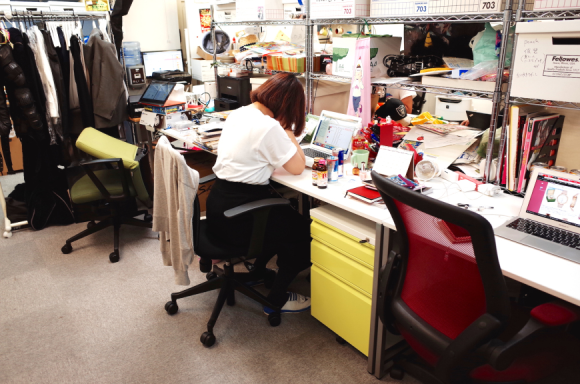
While perseverance is a trait to be admired, there comes a point where “Suck it up, buttercup” is just terrible career advice.
Among the most exalted virtues in Japan is the ability to gaman. Literally translating as just “endure,” gaman gets used whenever someone powers through a tough situation by redoubling their efforts.
In a lot of ways, this gaman culture can make Japanese companies a great place to work. In times of crisis, it encourages people to pitch in above and beyond the call of duty, and also discourages the type of complaining that doesn’t do anything but sap the energy and productivity out of a workplace.
But sometimes people can get so wrapped up in the whole gaman thing that it blinds them to the fact that they’re actually spending their days in a toxic working environment. So to help remove the gaman goggles, Japanese employment site Kore Kara no Tenshoku has compiled a list of 20 signs that the company where a woman is working really isn’t the kind of place she should be wasting her talents in.
1. You do more than 40 hours of overtime a month.
2. It’s a matter of course that when 8 p.m. rolls around, you’re still working.
3. You’re busy every weekday, and even work some weekends, but you’re not allowed to take any time off.
4. The company is unproductive.
5. If your boss is still at his desk, you feel self-conscious about clocking out.
6. You feel guilty about putting in a request for a day off.
7. Your company technically allows employees to take leave, but no one actually does.
8. Less than 10 percent of your company’s managers are women
9. The office atmosphere isn’t at all accepting about discussing your future career path.
10. The company allows workers to request transfers to other departments, but no one takes advantage of it.
11. You find the company regulations to be discriminatory based on gender.
12. You feel that male and female employees are evaluated using different criteria or in a way that steers them towards different results.
13. The people who get raises or promotions are the ones who spend the most time working.
14. Many people are still in the office after 10 p.m.
15. Many employees eat their lunch at their desks, while still working away on their computers.
16. You feel that the male employees have a poor understanding of their female counterparts.
17. There aren’t any older or higher-ranking employees in the company who you see as a role-model.
18. Few female employees return to the company after taking maternity leave.
19. Looking at your coworkers, you see hardly any successful working mothers.
20. You believe your boss’ way of speaking constitutes sexual or power harassment.
While many of these are obvious things to be concerned about, a few are possible indicators of more subtle problems. If your salary isn’t tied to performance incentives, it might seem like no skin off your back if the company isn’t productive, but that shortcoming might speak to a broader corporate culture that doesn’t properly value its employees’ time and energy, arguably its two most important assets. Likewise, transfer request systems that go unutilized could be proof that the company isn’t really as committed to employee satisfaction as it pretends to be.
For those reasons, Kore Kara no Tenshoku recommends that if five or more items on its list are applicable to a woman’s company, it’s time for her to look for a new, better job. Honestly, you could probably give that exact same advice to male employees as well, since even if the woman-specific entries don’t apply directly to them, they’re still signs of a pretty bad place to work.
Source: Bstyle
Images ©RocketNews24
[ Read in Japanese ]


 Spend a shift working in a terrible, soul-crushing Japanese company at this “special” Tokyo event
Spend a shift working in a terrible, soul-crushing Japanese company at this “special” Tokyo event What are the worst things about the first year working in a Japanese company? Survey investigates
What are the worst things about the first year working in a Japanese company? Survey investigates Meetings and more meetings: Foreigners list the pros and cons of working at a Japanese company
Meetings and more meetings: Foreigners list the pros and cons of working at a Japanese company Japan has a new bar just for people thinking about quitting their jobs, and the drinks are free
Japan has a new bar just for people thinking about quitting their jobs, and the drinks are free Japanese company will tell your boss you’re quitting for you, sees high demand for its services
Japanese company will tell your boss you’re quitting for you, sees high demand for its services The fish in rural Fukui that rivals Japan’s most auspicious sea bream
The fish in rural Fukui that rivals Japan’s most auspicious sea bream Japan’s craziest burger chain takes menchi katsu to new extreme levels
Japan’s craziest burger chain takes menchi katsu to new extreme levels Japanese restaurant chain serves Dragon Ball donuts and Senzu Beans this spring
Japanese restaurant chain serves Dragon Ball donuts and Senzu Beans this spring Japan Extreme Budget Travel! A trip from Tokyo to Izumo for just 30,000 yen [Part 1]
Japan Extreme Budget Travel! A trip from Tokyo to Izumo for just 30,000 yen [Part 1] Domino’s erupts with a 1kg Cheese Volcano in Japan
Domino’s erupts with a 1kg Cheese Volcano in Japan Shinjuku izakaya’s all-you-can-eat-and-drink plan is one of Tokyo’s best secret cheap eats
Shinjuku izakaya’s all-you-can-eat-and-drink plan is one of Tokyo’s best secret cheap eats We taste makunouchi bento at four Japanese convenience store chains【Taste comparison】
We taste makunouchi bento at four Japanese convenience store chains【Taste comparison】 Which convenience store onigiri rice balls are the most popular? Survey reveals surprising results
Which convenience store onigiri rice balls are the most popular? Survey reveals surprising results Brand-new Pokémon park opens in Japan with larger-than-life-size Lapras【Photos】
Brand-new Pokémon park opens in Japan with larger-than-life-size Lapras【Photos】 Saikaku’s Edo-era tales of gay samurai love reimagined for a modern audience as Boys Love manga
Saikaku’s Edo-era tales of gay samurai love reimagined for a modern audience as Boys Love manga Starbucks Japan releases first-ever Hinamatsuri Girls’ Day Frappuccino
Starbucks Japan releases first-ever Hinamatsuri Girls’ Day Frappuccino Highest Starbucks in Japan set to open this spring in the Tokyo sky
Highest Starbucks in Japan set to open this spring in the Tokyo sky Tokyo Skytree turns pink for the cherry blossom season
Tokyo Skytree turns pink for the cherry blossom season Yakuzen ramen restaurant in Tokyo is very different to a yakuza ramen restaurant
Yakuzen ramen restaurant in Tokyo is very different to a yakuza ramen restaurant Japan has only one airport named after a samurai, so let’s check out Kochi Ryoma【Photos】
Japan has only one airport named after a samurai, so let’s check out Kochi Ryoma【Photos】 Japanese drugstore sells onigiri at pre-stupid era prices, but how do they compare to 7-Eleven?
Japanese drugstore sells onigiri at pre-stupid era prices, but how do they compare to 7-Eleven? Burning through cash just to throw things away tops list of headaches when moving house in Japan
Burning through cash just to throw things away tops list of headaches when moving house in Japan Starbucks Japan releases new sakura goods and drinkware for cherry blossom season 2026
Starbucks Japan releases new sakura goods and drinkware for cherry blossom season 2026 Japan’s newest Shinkansen has no seats…or passengers [Video]
Japan’s newest Shinkansen has no seats…or passengers [Video] Foreigners accounting for over 80 percent of off-course skiers needing rescue in Japan’s Hokkaido
Foreigners accounting for over 80 percent of off-course skiers needing rescue in Japan’s Hokkaido Super-salty pizza sends six kids to the hospital in Japan, linguistics blamed
Super-salty pizza sends six kids to the hospital in Japan, linguistics blamed Starbucks Japan unveils new sakura Frappuccino for cherry blossom season 2026
Starbucks Japan unveils new sakura Frappuccino for cherry blossom season 2026 Foreign tourists in Japan will get free Shinkansen tickets to promote regional tourism
Foreign tourists in Japan will get free Shinkansen tickets to promote regional tourism The 10 most annoying things foreign tourists do on Japanese trains, according to locals
The 10 most annoying things foreign tourists do on Japanese trains, according to locals Take a trip to Japan’s Dododo Land, the most irritating place on Earth
Take a trip to Japan’s Dododo Land, the most irritating place on Earth Naruto and Converse team up for new line of shinobi sneakers[Photos]
Naruto and Converse team up for new line of shinobi sneakers[Photos] Is China’s don’t-go-to-Japan warning affecting the lines at a popular Tokyo gyukatsu restaurant?
Is China’s don’t-go-to-Japan warning affecting the lines at a popular Tokyo gyukatsu restaurant? Survey asks foreign tourists what bothered them in Japan, more than half gave same answer
Survey asks foreign tourists what bothered them in Japan, more than half gave same answer Japan’s human washing machines will go on sale to general public, demos to be held in Tokyo
Japan’s human washing machines will go on sale to general public, demos to be held in Tokyo Starbucks Japan releases new drinkware and goods for Valentine’s Day
Starbucks Japan releases new drinkware and goods for Valentine’s Day We deeply regret going into this tunnel on our walk in the mountains of Japan
We deeply regret going into this tunnel on our walk in the mountains of Japan Studio Ghibli releases Kodama forest spirits from Princess Mononoke to light up your home
Studio Ghibli releases Kodama forest spirits from Princess Mononoke to light up your home Major Japanese hotel chain says reservations via overseas booking sites may not be valid
Major Japanese hotel chain says reservations via overseas booking sites may not be valid Put sesame oil in your coffee? Japanese maker says it’s the best way to start your day【Taste test】
Put sesame oil in your coffee? Japanese maker says it’s the best way to start your day【Taste test】 No more using real katana for tourism activities, Japan’s National Police Agency says
No more using real katana for tourism activities, Japan’s National Police Agency says Five magic Japanese phrases to know before starting a job in Japan
Five magic Japanese phrases to know before starting a job in Japan Japanese company that will quit your job for you sees rush of clients to start 2020
Japanese company that will quit your job for you sees rush of clients to start 2020 Japanese ladies list top five companies whose employees they’d most/least like to date
Japanese ladies list top five companies whose employees they’d most/least like to date Japanese woman fed up with being expected to serve male coworkers tea shatters corporate culture
Japanese woman fed up with being expected to serve male coworkers tea shatters corporate culture Japan’s job-quitting service gets four new customers on first day of work
Japan’s job-quitting service gets four new customers on first day of work Nearly half of young Japanese women say they “hate” the company they work for in survey
Nearly half of young Japanese women say they “hate” the company they work for in survey Japanese manners debate: Is it OK to tell your coworkers “I’ve found a new job?”
Japanese manners debate: Is it OK to tell your coworkers “I’ve found a new job?” 30 things workers in Japan often find themselves thinking in their first six months on the job
30 things workers in Japan often find themselves thinking in their first six months on the job Japanese salaryman fears backlash against attractive people due to company paternity leave system
Japanese salaryman fears backlash against attractive people due to company paternity leave system Tokyo companies’ late-night overtime habits exposed in time-lapse YouTube video channel【Videos】
Tokyo companies’ late-night overtime habits exposed in time-lapse YouTube video channel【Videos】 Japanese company trips – Workers “absolutely hate” them, so why do they still happen?
Japanese company trips – Workers “absolutely hate” them, so why do they still happen? Japan’s job-quitting service claims bosses contact it to try to make their employees quit
Japan’s job-quitting service claims bosses contact it to try to make their employees quit Woman sues Tokyo company after having to work 48 days in a row with limited bathroom breaks
Woman sues Tokyo company after having to work 48 days in a row with limited bathroom breaks Japanese women explain why they give “obligation chocolate” to male coworkers on Valentine’s Day
Japanese women explain why they give “obligation chocolate” to male coworkers on Valentine’s Day Japanese company prohibits employees from smoking on their commute to the office
Japanese company prohibits employees from smoking on their commute to the office